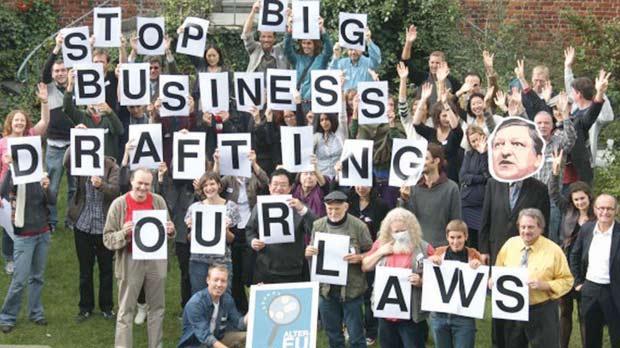De Gucht downplays corporate dominance in TTIP talks

Euractiv | 25/06/2014
De Gucht downplays corporate dominance in TTIP talks
EurActiv with Reuters
Multinational companies will not be given too much power by a trade agreement between the European Union and the United States, the EU’s trade chief said on Tuesday (24 June), seeking to reassure consumer and environmental groups opposed to the pact.
Washington and Brussels are negotiating the accord, the world’s biggest, which would create a market of 800 million people. But popular opposition to a deal is growing.
EU leaders and US President Barack Obama face the complex task of showing they can juggle the demands of industry and those of people worried about food safety and the environment.
"Our choice is not between a world where each does as he pleases and a nightmare where we are ruled directly by multinational corporations," EU Trade Commissioner Karel De Gucht told businesses, trade unions and diplomats at Thomson Reuters in London.
Opposition builds up in Europe
Protest parties from across Europe’s political spectrum have rallied against the proposed US-EU deal, known as the Transatlantic Trade and Investment Partnership, or TTIP. They performed well in May elections for the European Parliament, warning voters of dire consequences if an accord is sealed.
European consumer and environmental groups say the biggest threat comes from a mechanism that would allow companies to bring claims against a country if it breaches the trade treaty.
They say the mechanism for settling disputes would allow multinationals to bully the EU’s 28 governments into doing their bidding regardless of environmental, labour and food laws.
The United States and the European Union deny that. They say dispute settlement has been an important part of trade accords since the North American Free Trade Agreement 20 years ago.
"There is nothing shocking here," De Gucht said. A mechanism for settling investor-state disputes provides protection, guarding companies against expropriation without compensation. "I am not seeking to destroy anyone’s soul," he said.
De Gucht has the option of removing a dispute mechanism from the agreement, although he says Washington will not accept that.
For businesses, protecting their interests, ranging from power grids to new factories, is crucial. Almost $3 billion (€2.2bn) in goods and services are already traded each day between the United States and Europe. Annual turnover of all foreign companies in the European Union is around 3 trillion euros.
An EU-US deal alone could add $100 billion (€73.5bn) a year to economic output on both sides of the Atlantic.
‘Better enforcement’
But the issue of dispute settlement proved so contentious that Australia rejected it in a trade deal with the United States that came into force in 2005, arguing that its legal system was robust enough to resolve problems.
Protests in Germany and France have led the European Commission, the executive arm of the European Union, to open a public consultation on the issue. Some 30,000 submissions have been made to the consultation’s website.
One way to keep both business and consumers happy would be to safeguard the rule of law through the dispute-settlement mechanism, De Gucht said. He would also like more transparency in arbitration tribunals, which would help quiet the frequent cry at anti-trade rallies that all disputes are resolved behind the backs of ordinary citizens.





